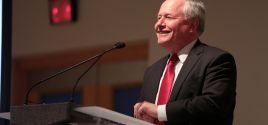Terror suspects were inexperienced - PakistanIrish ExaminerAug. 17, 2006 |
Popular 
Bill Kristol: My Fellow White Americans Are 'The Enemy'

Israel Detains American Journalist for Reporting on Damage from Iran's Strikes [UPDATE]

Journalist Jeremy Loffredo Released After Four Days in Israeli Detention, Ordered Not to Leave

Chris Rufo Discovers Who is Flooding The Small Town of Charleroi, Pennsylvania With Haitian Migrants

WATCH: New Film 'Atrocity Inc' Exposes How Israel Lied About October 7th to Justify Genocide
 Top Pakistani intelligence agents said today the alleged terror suspects arrested last week over an alleged plot to blow up a number of planes crossing the Atlantic did not have had the experience to carry out the attack. But the two senior agents said that if the alleged terror cell members arrested in Pakistan and Britain last week had undergone appropriate weapons and explosives training, they could have emulated massive attacks like those five years ago in New York and Washington as well as the July 7, 2005, London commuter system bombings. As many as 17 people have been arrested in Pakistan, including alleged ringleader Rashid Rauf, while another 24 have been detained in Britain. British national Rauf’s 22-year-old brother, Tayib, is among those in British custody. Those detained in Britain whose assets were frozen range in age from 17-35. In London, British investigators were to explain to a judge in a closed-door hearing today why suspects arrested in a foiled plot to blow up as many as 10 trans-Atlantic airliners should be kept in custody without charge. Under new terrorism laws, the suspects in Britain can be held for up to 28 days as investigators prepare charges. Home Secretary John Reid said some suspects would likely not be charged with major offences. The suspects arrested in Pakistan and Britain were not “experienced” and “trained” like al Qaida operatives who had carried out the September 11 attacks and last year’s London bombings, but were “filled with hate” for Britain and the United States, one of the intelligence officials said. “I don’t know how close they were from executing the attacks, but I personally believe that they wanted to do it to mark the (5th anniversary of) 9/11 attacks,” the official said. “I personally think they would have carried out the attacks if they had been experienced enough.” The detainees in Britain and Pakistan had not attended terror-training camps in Pakistan or neighbouring Afghanistan and had relied on information gleaned from text books on how to make bombs, the officials said. The Pakistani officials said Rauf met with al Qaida figures inside Pakistan in the lead-up to his arrest last week. Rauf, a British national of Pakistani descent aged in his 30s, had also been in contact – through intermediaries – with the purported No. 3-ranked al Qaida leader at large in neighbouring Afghanistan. The officials declined to give the al Qaida leader’s name. The Pakistani intelligence officials said authorities had arrested a suspected militant near Pakistan’s border with Afghanistan in June. The man confessed to being aware of a terror plot in-the-making involving attacks in Britain and the United States. The next month, British authorities notified Pakistani counterparts about several British Muslims who had travelled to Pakistan to help plan the attacks. Some of the suspects had returned to Britain, but some remained i Pakistan. One of the officials said British intelligence agencies had planted a “spy” close to Rauf, who reported back to London on the plans to blow up passenger planes bound for the United States. British authorities immediately reported the plot to Pakistani counterparts, who advised to proceed with arrests of suspects in Britain before the attacks or a practice run could be carried out, the officials said. Pakistani security forces moved in and arrested Rauf in the eastern Punjab provincial town of Bhawalpur days before British authorities rounded up more than 20 suspects between August 9 and 10. “What we know is that the terror plot was at an initial stage, and the plotters were not ready for the strikes,” one of the officials said. “It was not an al Qaida-sanctioned plot, but the plotters had the support of an al Qaida figure based in Afghanistan.” In Bhawalpur, a man claiming to be Rauf’s brother-in-law said police detained the terror suspect as he tried to leave the town on a bus to the nearby city of Multan on August 9. Hafiz Mohammed Sohaib said his sister married a man by the name of Khalid Rauf three years ago. Police told Sohaib’s family that Khalid was an alias for Rashid Rauf. Several days after his arrest, police commandos and plainclothes officers raided Rauf’s home and confiscated a computer and identity documents, Sohaib said. “They (the police) introduced him (the detained man) to us as Rashid Rauf,” said Sohaib, who teaches at an Islamic religious seminary, or madrassa, called Jamia Darul Ulum Madina that his father established in 1965. “This name was totally new for us.” Sohaib said Rauf never attended the madrassa and would pray five times daily - in accordance with Islamic custom – at home with his two children. “We cannot believe that he can do anything like this of which he is accused. We could not say by the way he lived that he could be linked with such people,” said a clearly emotional Sohaib, his eyes welling with tears. Sohaib did not know if Rauf held British citizenship and knew him only as a seller of refrigerators. Sohaib said his other sister is married to the brother of Maulana Masood Azhar, the wanted head of the outlawed Jaish-e-Mohammed militant group. India arrested Azhar in Indian-controlled Kashmir in 1994 and accused him of belonging to a Pakistani militant group opposed to Indian influence in Kashmir. But he was freed five years later in exchange for passengers on an Indian Airlines jet hijacked by Islamic militants and taken to the Afghan city of Kandahar. Officials have not previously suggested any link between Rauf and Azhar. In Rauf’s ancestral village of Haveli Beghal, in Pakistan-controlled Kashmir, resident Mazar Iqbal said he spoke with Rauf about three months ago but had no details on his current whereabouts. “He (Rauf) was staying here, but I don’t know if he is here now,” Iqbal said. “He is a nice man.” Rauf moved to Pakistan shortly after his maternal uncle was stabbed to death in April 2002. Rashid Rauf was reportedly a suspect in that murder and police raided his Birmingham home as part of the homicide probe. Another Pakistani official said a court had approved an extension to Rauf’s detention to enable further interrogations. It was unclear how long the detention period had been extended for. British and Pakistan officials have suggested Rauf, who left England shortly after a 2002 murder which he was a suspect in, could be soon extradited back to Britain. A team of British officials specialised in legal affairs has arrived in Pakistan to discuss legal affairs surrounding Rauf’s detention, the official said. It was unclear if they would also discuss his possible extradition. |



